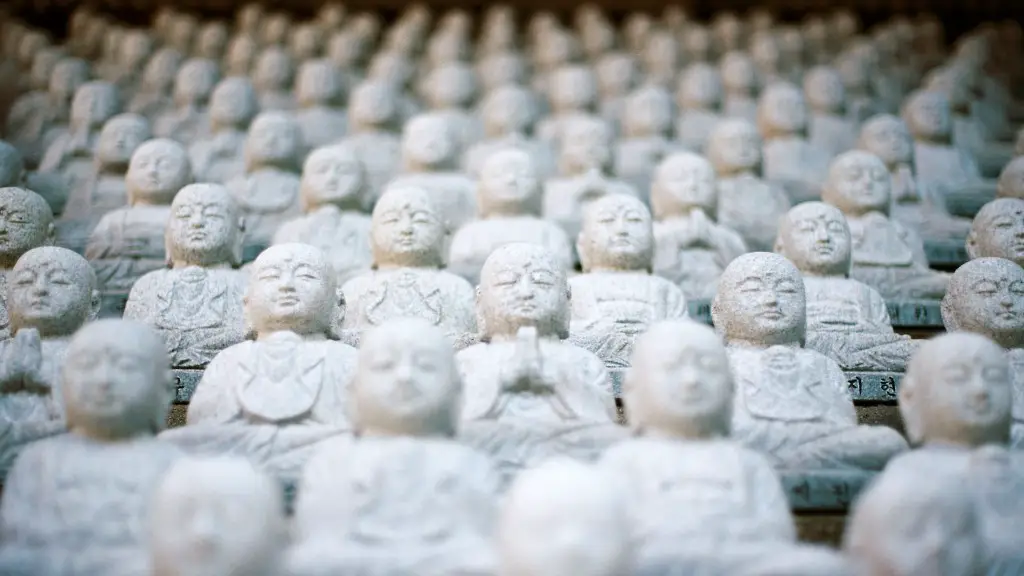Hinduism is one of the oldest and most complex religious belief systems in the world. It has no single founder and is based on thousands of years of spiritual traditions. One of its fundamental aspects is its pantheon of gods, each of with their own personalities, stories, and symbols. But how many gods are there in Hinduism, and what do they represent?
Hinduism is based on belief in multiple gods, or polytheism, which is the worship of multiple gods or goddesses. There is no single number of gods in Hinduism, as different sects and schools typically focus on different deities. Depending on the sect, Hindus may worship anywhere from three to 330 million gods.
According to ancient Hindu texts, the gods have different attributes and characteristics that reflect different aspects of the world. For example, Brahma is viewed as the creator of the universe, Vishnu is the preserver of life, and Shiva is the destroyer. Each of these gods is part of an interconnected, divine energy that permeates the universe.
The gods in Hinduism are often personifications of natural forces, such as fire and water, that are seen as embodying cosmic powers. Other gods are seen as embodiments of virtues and ideals, such as truth and justice. While Hinduism is polytheistic, it is also monotheistic in that all the gods are seen as mere aspects or forms of Brahman, the one divine essence or power that all gods emanate from.
Hindus also pay tribute to many demigods, which are lesser gods that embody aspects of the greater divine principle. These demigods, who are generally identified with celestial beings such as stars and planets, are seen as bridges between the mortal world and the spiritual realm. They are believed to be able to intercede with the higher gods, allowing devotees to ask for their help in solving earthly problems.
Hinduism also includes goddesses, many of whom are connected to deities. For example, Parvati is the wife of Shiva and is seen as a symbol of devotion and loyalty, while Lakshmi is the goddess of fortune and abundance and is often worshipped during festivals.
The many gods and goddesses in Hinduism allow devotees to connect to the divine in different ways. Hindus believe that the divine is complex and multifaceted, and the gods provide devotees with an opportunity to connect to the divine in a way that suits their individual needs and desires.
The role of Avatars
Hinduism also includes avatars, which are incarnations of the gods that have taken physical forms to help and protect the people. There have been many avatars over the centuries, including Rama and Krishna, who are viewed as embodiments of the divine principle. Avatars are believed to have extraordinary and miraculous powers, and their stories are often recounted in Hindu holy texts. Avatars are seen as exemplars of spirituality and are revered as living gods.
Rituals and Traditions
Worship of Hindu gods is typically done in a temple or shrine, and involves rituals such as chanting mantras, offering flowers and incense, and the recital of prayers. Hindus believe that these rituals, when done with devotion and sincerity, can bring blessings and positive energy into their lives. In addition, festivals and celebrations honoring different gods are often held throughout the year.
Symbols and Figures
Each god in Hinduism has a unique symbol or figure associated with them. These symbols typically represent certain attributes and qualities of the god, and devotees often use them as reminders of the god’s presence in their lives. For example, the symbol for Vishnu is the conch shell, which represents his ability to create and preserve life. Similarly, Lakshmi is symbolized by the lotus flower, which is a symbol of purity and beauty.
Myths and Legends
Hinduism also has a rich collection of myths and legends related to its gods and goddesses. These stories, which are often found in ancient Vedic scriptures, provide insight into the divine power of the gods and their importance in Hinduism. They also tell of the adventures and incredible feats of the gods, which are still remembered and kept alive by generations of devotees.
Connecting with the Divine
The many gods in Hinduism offer devotees the chance to connect to the divine in different ways. By interacting with the gods and goddesses, devotees can understand the intricacies of the divine and its complexities. Hinduism also encourages devotees to tap into their own spirituality by engaging with the gods and incorporating their teachings into their lives.
Gods in Everyday Life
Gods and goddesses also play an important role in everyday Hindu life. Hindus often make offerings to the gods before embarking on important journeys or activities. They also offer prayers and sacrifices to the gods as a way of seeking their protection and blessings. Further, Hindu culture is deeply rooted in its gods and goddesses, with a great reverence for these divine figures being evident in day-to-day life.
